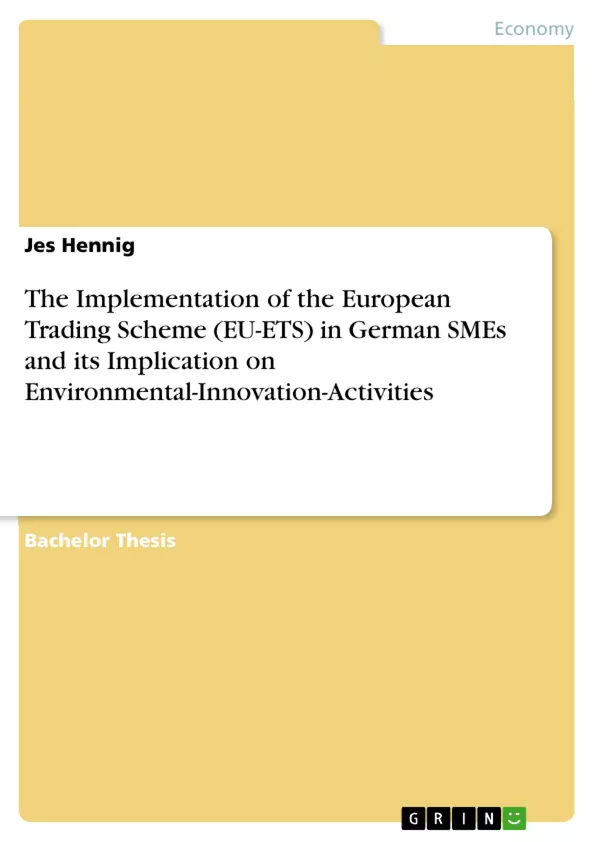
The Implementation of the European Trading Scheme (EU-ETS) in German SMEs and its Implication on Environmental-Innovation-Activities
Bachelorarbeit, 2014
43 Seiten, Note: 2,0
Leseprobe
Inhaltsverzeichnis (Table of Contents)
- Introduction
- Methodology
- EU-ETS
- Theoretical background: Implementation and development of the EU-ETS
- Phase I
- Phase II
- Phase III
- Political asymmetry and carbon leakage
- Theoretical background: Implementation and development of the EU-ETS
- Status quo of the EU-ETS
- SMEs in the German economy
- Adaption of the EU-ETS within German SMEs
- Environmental-innovation-activities
- Short-term impacts of eco-innovation-activities
- Long-term impacts of eco-innovation-activities
- Porter hypothesis
- Porter hypothesis within the EU-ETS
- Criticism on Porters' hypothesis
- Further research
Zielsetzung und Themenschwerpunkte (Objectives and Key Themes)
This thesis examines the implementation of the European Trading Scheme (EU-ETS) within German small and medium-sized enterprises (SMEs) and investigates the resulting impacts on environmental innovation activities. The study aims to understand how SMEs adapt to the regulatory requirements of the EU-ETS and explore the potential for innovation in pollution-reducing measures.
- The implementation of the EU-ETS within German SMEs
- The impact of the EU-ETS on environmental innovation activities in SMEs
- The role of the Porter hypothesis in the context of the EU-ETS
- The importance of SMEs for the German economy
- The potential for synergy between environmental protection and innovation
Zusammenfassung der Kapitel (Chapter Summaries)
The introduction provides an overview of the EU-ETS and its significance for reducing greenhouse gas emissions. It also highlights the importance of SMEs in the German economy and the need to understand their role in implementing the EU-ETS.
The methodology chapter outlines the research approach used in the study. It explains the data sources, research methods, and analytical framework employed.
The EU-ETS chapter delves into the theoretical background of the scheme, covering its implementation and development across different phases. It also discusses the challenges of political asymmetry and carbon leakage.
The status quo of the EU-ETS chapter analyzes the current state of the scheme, examining its effectiveness and limitations.
The SMEs in the German economy chapter explores the characteristics and role of SMEs in the German economy. It then focuses on how SMEs are adapting to the EU-ETS and the implications for their environmental innovation activities.
The Porter hypothesis chapter examines the potential for the EU-ETS to stimulate innovation and economic growth, exploring both the theoretical framework and criticisms of the hypothesis.
The further research chapter outlines potential areas for future research in this field.
Schlüsselwörter (Keywords)
The key terms and concepts explored in this thesis include the European Trading Scheme (EU-ETS), small and medium-sized enterprises (SMEs), environmental innovation, pollution reduction, greenhouse gas emissions, the Porter hypothesis, and the German economy.
Frequently Asked Questions
What is the EU-ETS?
The European Trading Scheme (EU-ETS) is a market-based cap-and-trade system designed to reduce greenhouse gas emissions by setting binding targets for 2020.
How do German SMEs participate in the EU-ETS?
SMEs account for nearly half of the German companies participating in the EU-ETS, requiring them to manage emission permits within their value chain.
What is the Porter hypothesis in this context?
The Porter hypothesis suggests that strict environmental regulations can trigger innovation, making companies more efficient and competitive in the long run.
Does the EU-ETS lead to "carbon leakage"?
Carbon leakage refers to the risk of companies moving production to countries with laxer regulations to avoid ETS costs, a challenge addressed in the study.
What is the impact of EU-ETS on eco-innovation?
The thesis investigates whether the regulatory pressure of the EU-ETS encourages German SMEs to develop new, pollution-reducing technologies.
Details
- Titel
- The Implementation of the European Trading Scheme (EU-ETS) in German SMEs and its Implication on Environmental-Innovation-Activities
- Hochschule
- Universität Hamburg
- Note
- 2,0
- Autor
- Jes Hennig (Autor:in)
- Erscheinungsjahr
- 2014
- Seiten
- 43
- Katalognummer
- V295506
- ISBN (eBook)
- 9783656945352
- ISBN (Buch)
- 9783656945369
- Dateigröße
- 1297 KB
- Sprache
- Englisch
- Schlagworte
- EU-ETS CO2 KMU SMEs Umweltökonomik VWL Innovationsökonomik Porter Emissionen Innovation Innovationen
- Produktsicherheit
- GRIN Publishing GmbH
- Preis (Ebook)
- US$ 20,99
- Preis (Book)
- US$ 29,99
- Arbeit zitieren
- Jes Hennig (Autor:in), 2014, The Implementation of the European Trading Scheme (EU-ETS) in German SMEs and its Implication on Environmental-Innovation-Activities, München, Page::Imprint:: GRINVerlagOHG, https://www.diplomarbeiten24.de/document/295506
- Autor werden
- Ihre Optionen
- Vertriebskanäle
- Premium Services
- Autorenprofil
- Textarten und Formate
- Services für Verlage, Hochschulen, Unternehmen

- © GRIN Publishing GmbH.
- Alle Inhalte urheberrechtlich geschützt. Kopieren und verbreiten untersagt.
- info@grin.com
- AGB
- Open Publishing
Der GRIN Verlag hat sich seit 1998 auf die Veröffentlichung akademischer eBooks und Bücher spezialisiert. Der GRIN Verlag steht damit als erstes Unternehmen für User Generated Quality Content. Die Verlagsseiten GRIN.com, Hausarbeiten.de und Diplomarbeiten24 bieten für Hochschullehrer, Absolventen und Studenten die ideale Plattform, wissenschaftliche Texte wie Hausarbeiten, Referate, Bachelorarbeiten, Masterarbeiten, Diplomarbeiten, Dissertationen und wissenschaftliche Aufsätze einem breiten Publikum zu präsentieren.
Kostenfreie Veröffentlichung: Hausarbeit, Bachelorarbeit, Diplomarbeit, Dissertation, Masterarbeit, Interpretation oder Referat jetzt veröffentlichen!
- GRIN Verlag GmbH
-
- Nymphenburger Str. 86
- 80636
- Munich, Deutschland
- +49 89-550559-0
- +49 89-550559-10
- info@grin.com
-









